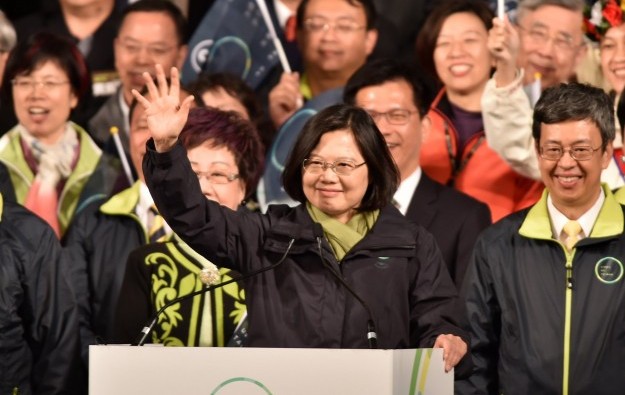Taiwan casino prospects gloomy post-election: analyst
Jan 18, 2016 Newsdesk Latest News, Rest of Asia, Top of the deck

The landslide win of Taiwan’s independence-minded Democratic Progressive Party (DPP) in Saturday’s elections could make it hard to move forward with gaming expansion including legalisation of casinos, said a note from Union Gaming Securities Asia Ltd on Monday.
Tsai Ing-wen (pictured centre), the DPP’s presidential candidate, won 56 percent of the vote, becoming the island’s first female leader. In elections also held on Saturday for the parliament, called the Legislative Yuan, the DPP won 68 of the 113 seats up for grabs, compared with only 35 for the ruling Kuomintang. It marked the first time the Kuomintang – with a much more pro-China stance relative to the DPP – has lost control of the island’s legislature.
“Following the elections, stern rhetoric has already come out of Beijing, including from the official press agency, Xinhua, which stated ‘the DPP’s return rule poses grave challenges to cross-Strait relations’,” said Union Gaming analyst Grant Govertsen.
“Separately, President Tsai has personally gone on record as being anti-gaming during the recent election cycle, and she had instructed DPP legislators in 2009 to vote against the bill to allow gaming referendums,” he added.
Taiwan lifted a 15-year prohibition on gambling on its outlying island chains of Kinmen, Matsu and Penghu in 2009. In a referendum in July 2012, the residents of Matsu voted in favour of casinos in that county to help attract tourists.
Taiwan’s Central News Agency reported in November that residents of Penghu would probably vote again this year on whether to allow casinos in the county. The local government’s Referendum Screening Committee has reportedly approved a proposal to hold a referendum early this year, but any such poll is still dependent on collecting enough assenting signatures from local residents and would need approval from Taiwan’s executive branch of government.
“If a referendum [in Penghu] is ultimately held it would likely occur this spring,” said Union Gaming’s Mr Govertsen.
“Heading into 2016 – and before the election of the DPP – there was chatter that the government would finally move forward with a gaming bill to allow Matsu (which already voted in favour of casinos), or any other outlying islands that pass a local referendum, to conduct an RFP [request for proposal] process,” he added.
Operators staying away
The brokerage however remains “somewhat pessimistic” about the chances of the required legislation moving forward while the DPP is in power.
Taiwan’s relationship with mainland China warmed during the eight years of Ma Ying-jeou’s presidency. But in May last year Xinhua reported that the Chinese authorities had ruled out the possibility of mainland China citizens being allowed to gamble in Taiwan casinos if such schemes ever come to fruition.
“With the DPP now controlling the levers of government in Taiwan, we would expect this already hard-line approach to mainlanders potentially gambling in Taiwan to harden further still,” said Mr Govertsen.
Union Gaming said it does not expect the Macau-based casino operators to participate in a request for proposal in Taiwan for what it describes as “three important reasons”.
“Given that policy is so important in driving the future of Macau, none would dare risk raising the ire of Beijing; the calculus has changed as the current (and future) Chinese VIP story is radically different than years past; and the explicit forbidding of mainlanders to gamble in Taiwan (if true) would result in the one-two punch of both a weak demand story and upsetting Beijing,” it said.
The brokerage additionally said that regional operators could also “shy away from the prospects of developing integrated resorts on Taiwan’s outlying islands absent a policy shift to allow mainlanders to gamble, as well as [absent] the setting of modest development budget requirements”.
“That said, there is clearly an appetite for gambling in Taiwan … and there would be significant interest in large-scale development if integrated resorts were approved for cities like Taipei or Kaohsiung,” wrote Mr Govertsen.
He added: “Even in a best case scenario where the new legislature finally creates integrated resort legislation, we think the first integrated resort is at least five years away.”
Related articles
-
 Taiwan firm eyes Europe slot market via...
Taiwan firm eyes Europe slot market via...Mar 26, 2024
-
 Extra Macau flights in Feb amid CNY,...
Extra Macau flights in Feb amid CNY,...Feb 02, 2024
More news
-
 GKL provides its new table game...
GKL provides its new table game...Nov 22, 2024
-
 The Baron Upright, a new cabinet from...
The Baron Upright, a new cabinet from...Nov 22, 2024
Latest News
Nov 22, 2024
Casino operator Grand Korea Leisure Co Ltd (GKL) says it has achieved its first commercialisation of a new-to-market table game, developed via an in-house competition dating to 2021. Grand Korea...Sign up to our FREE Newsletter
 (Click here for more)
(Click here for more)
Pick of the Day
”As we navigate the final steps of the licensing process, we remain confident in our ability to align with Brazil’s regulatory requirements”
Eusebio Tanco
Chairman of DigiPlus Interactive
Most Popular
 Gaming technology firm IGT reports hacking incident November 21, 2024
Gaming technology firm IGT reports hacking incident November 21, 2024  US$30bln 2025 GGR target achievable for Macau: CE November 19, 2024
US$30bln 2025 GGR target achievable for Macau: CE November 19, 2024  Marina Bay Sands projects 40pct EBITDA leap post extension November 20, 2024
Marina Bay Sands projects 40pct EBITDA leap post extension November 20, 2024  Macau big-event outdoor venue gets trial run Dec 28: CE November 20, 2024
Macau big-event outdoor venue gets trial run Dec 28: CE November 20, 2024  Future of gaming is the online format: Pagcor chairman November 20, 2024
Future of gaming is the online format: Pagcor chairman November 20, 2024









